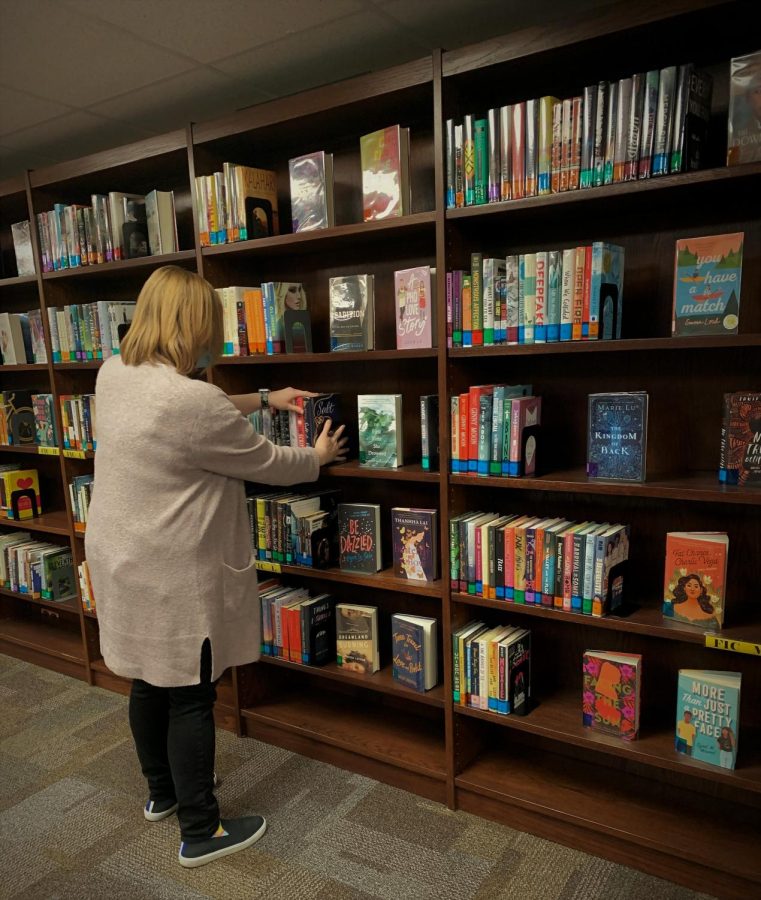Bos staff respond to book bans
Complaints in neighboring districts concern some faculty
Boswell Librarian Nicole Graham shelves books in the library. Graham is one of several Bos staff members concerned about bans on certain books in neighboring school districts.
A statewide effort by Texas Governor Greg Abbott and other officials to purge certain books from school and teacher libraries–including those in nearby school districts–has some Boswell staff on high alert.
“This is the first time in 10 years that I felt like it was a possibility that it was going to happen like that,” Librarian Nicole Graham said.
According to the Texas Tribune, at a Jan. 20 speech at a Lewisville charter school, Abbott promised a “parental bill of rights” amendment to the Texas constitution. That announcement is the latest in a wave of banning books Republican officials have labeled as pornographic or that address race or sexuality.
In November, Abbot ordered the Texas Education Agency to investigate “the availability of pornography” in Texas schools, and state Rep. Matt Krause, R-Fort Worth, sent a list of about 850 books to school districts asking whether they were available on campuses. Many books that were targeted relate to people of color or the LGBTQ+ community.
Parents in neighboring districts have also challenged books in order to get them banned.
Keller ISD cut the graphic novel, “Gender Queer: A Memoir,” by Maia Kobabe, from its libraries after parental complaints about a sexually explicit scene. In Carroll ISD, a former teacher of the year was reprimanded after a parent raised concerns over a book in her classroom library, “This Book is Ant-Racist: 20 Lessons on How to Wake Up, Take Action, and Do the Work,” by Tiffany Jewell.
Graham said that parents complaining about books isn’t new and that librarians are trained to deal with books being challenged and how to proceed with the process.
So far no complaints have happened at Bos or EMSISD, but with other investigations happening so close, Graham said she fears having to put that training to use.
Graham said that parents do have a right to challenge books, but doing so requires going through a process that includes reading the whole book in its entirety.
“You can’t necessarily judge the quality of an entire book based on a few parts that certain people may have different opinions about whether or not that is okay or inappropriate,” she said.
Even though Boswell itself has had no major complaints by parents about books being too inappropriate, the implications of these challenges actually turning into a statewide book ban unnerves English teachers Casey Gause and Shannon Conners-Casillo.
“I’m not an advocate for banning books at all, so it concerns me when I hear things like this.” Gause said.
Connors-Casillo compared the situation to a dystopian novel that discusses burning books and the importance of literature.
“You read books about books being banned. Like man, I’m living in Fahrenheit 451,” she said. “It’s so scary on that end, but I also feel really sad because I think of how lucky I am to grow up in a society that was not so scared to read books.”
School libraries have always been an easy and free way to access books that students personally enjoy, but proponents of such bans argue students who want to be exposed to these books should purchase them themselves.
Graham disagrees.
“I think that using the whole, ‘Well, they can just buy it,’ is not a good argument,” Graham said, “because we do have a lot of students that, that’s just not a possibility.”
Graham said she views the library as a place where students can find books that portray different characters and places.
“That way students can feel like they have a place that they can go, and feel comfortable and not judged, and just find these books that have these types of characters in them is really important,” she said.
Gause pointed out the difference between a book being available for students to choose and a book being required reading.
“I don’t want any student to feel uncomfortable, so I wouldn’t want any student to be required to read something that might be offensive to them, but I would like as many titles available as possible,” Gause said.
Graham said that every time a book featuring diverse groups gets challenged for a removal, it only seems to gain popularity and increased sales, possibly reaching minors everywhere.
“Along with all the other problems that go along with book challenges, I think it ends up going against the aim of the people who are actually putting in the challenge,” Graham said.
Your donation will support the student journalists of Boswell High School. Your contribution will allow us to purchase equipment and cover our annual website hosting costs.

